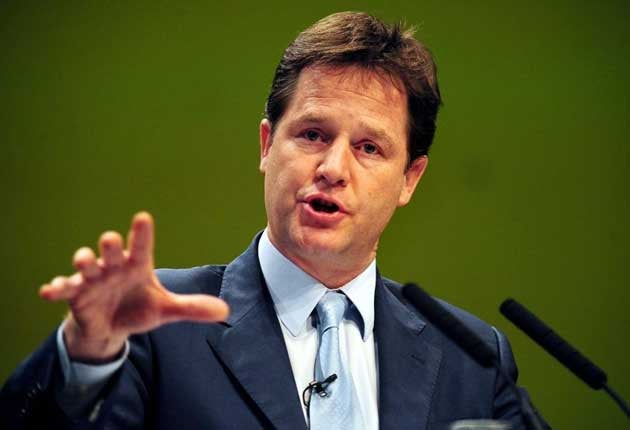Nick Clegg: 'Voices of riot victims will be heard'

The Government is to establish an independent panel to give victims of the riots a chance to "have their voice heard", Deputy Prime Minister Nick Clegg said today.
Mr Clegg told a Whitehall news conference that the communities and victims panel, chaired by an independent figure, would produce a report within six to nine months to be presented to the leaders of all three main political parties.
"It won't be a public inquiry, it won't be established under the Inquiries Act, but it will serve as a way in which victims and communities can have their voice heard," he said.
Mr Clegg said the Cabinet Office would also be tendering for a contract to do research into the communities affected by the disturbances to find out more about "what happened, who did what and why they did it".
"It is really important at a time like this that we should not allow hope and optimism to be suffocated by fear and pessimism," he said.
Mr Clegg also confirmed plans for a "riot payback scheme", with offenders helping to clean up areas hit by the disturbances.
Victims will also be given the right to confront those who tore up their neighbourhoods to hammer home the fact that the actions of rioters had consequences, with additional money provided to make that possible.
Mr Clegg said: "In every single one of the communities affected there will be community payback schemes, riot payback schemes, where you will see people in visible orange clothing making up the damage done, repairing and improving the neighbourhoods affected.
"I also want them to face their victims. I want them to face people like the woman I met on Monday last week in Tottenham, who said to me that she was still wearing the clothes ... she was wearing when she ran out of her flat before her own flat was burned down.
"The offender who did that, who set fire to that building, should have to face her and understand that there are human consequences, to explain why he or she did what they did and to apologise."
As part of the measures to end the "dismal cycle of repeat crime", Mr Clegg also said that those released from jail from March next year would be "met at the prison gates" by providers in the Work Programme.
The offenders will be put through a "tough process so that they find work and they stay on the straight and narrow".
A commission to examine the causes of the riots had been called for by Labour leader Ed Miliband, but David Cameron originally resisted the suggestion.
Mr Clegg said: "It's not a question of who has persuaded who of what. There have been various discussions between the party leaders over the weekend and, indeed, yesterday. We are not there yet in terms of the details.
"The principle is really clear. We don't want a grandees committee, we want a grassroots process where people in the communities affected and the victims who have been so damaged and hurt can give their views about what needs to happen to ensure it doesn't happen again."
Mr Clegg backed Work and Pensions Secretary Iain Duncan Smith's plan to strip some benefits from rioters but warned that there could be "unintended consequences" unless the scheme was carefully thought out .
He said: "We are going to take our time to look at this. Of course you need to be proportionate, of course you need to be careful, of course you don't want to create unintended consequences where the taxpayer ends up footing more of the bill or we create more social problems or problems of law and order.
"But the principles are clear: there is conditionality in our benefits system, you can't just expect a blank cheque whatever you do, that there are consequences for your actions - that's built into the system already - and we are now going to take our time to reflect carefully on how to build on that."
Mr Clegg acknowledged the Liberal Democrats had been forced to drop their previous opposition to extending gang injunctions to cover under-18s
"I don't think anyone could have witnessed last week's events and somehow been complacent about gang culture," he said.
"There does seem to be some early evidence that in some areas there was a very strong gang element and there is even some anecdotal evidence that gangs were co-operating to maximise their looting opportunities.
"Of course we need to look at that and that is why I think it is right that we revisit our positions on gang culture."
PA
